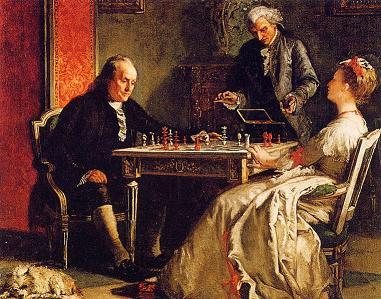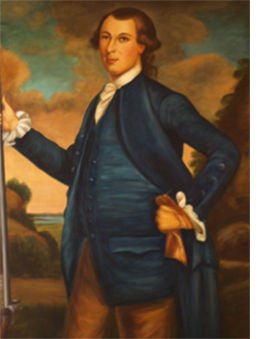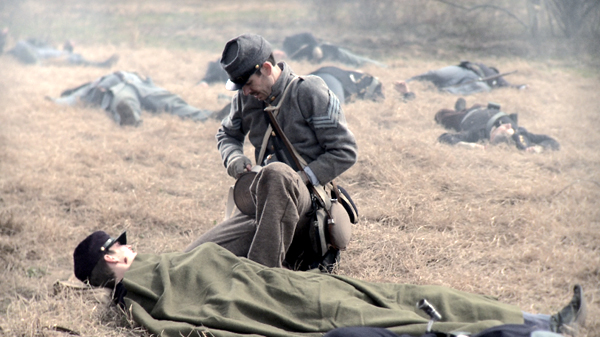BLOG, or DIE. Author Bio
Wednesday, 12 January 2011
Franklin's Morals of Chess

ABOVE: Ben Franklin Playing Chess by Edward Harrison (1824-1887)
Although I don’t get to play it very often, I love the game of chess. Over the years I have studied it from a historical perspective, written articles about it (READ HERE), done talk-radio (LISTEN HERE), and been quoted on ESPN Classic (Searching For Bobby Fischer episode). I’m far from an expert on the subject, but I am an enthusiast and I am fascinated by its place in American history.
Referred to as the “Game of Kings,” it’s no surprise that many of our country’s Founders including Ben Franklin, Thomas Jefferson, and George Washington enjoyed chess. According to an article written for the website Mega-Chess by historical researcher and painter Maria Radnoti, “Franklin had a chess set of the French Regency design, as well as a miniature ivory set. Washington had an ivory chess set, and Jefferson had at least a half dozen chess sets. …Jefferson had one beautiful set of carved ivory busts presented to him by the French government, but it was missing the kings, as legend has it, because the French didn’t want to offend a man who had worked so hard to rid America of kings. Jefferson also had a conventional English Barleycorn bone chess set, and the design was growing in popularity, almost becoming a standard before the Staunton style emerged.”
Most experts believe that Jefferson and Franklin were the most evenly-matched opponents. Both men wrote much about the game in their personal writings and Franklin actually penned the first chess article ever published. His “Morals of Chess” presented Franklin’s own philosophies on the game as well as practical advice and behavior tips for players. He wrote:
The game of Chess is not merely an idle amusement. Several very valuable qualities of the mind, useful in the course of human life, are to be acquired or strengthened by it, so as to become habits, ready on all occasions.
1. Foresight, which looks a little into futurity, and considers the consequences that may attend an action; for it is continually occuring to the player, 'If I move this piece, what will be the advantages or disadvantages of my new situation? What use can my adversary make of it to annoy me? What other moves can I make to support it, and to defend myself from his attacks?
2. Circumspection, which surveys the whole chessboard, or scene of action; the relations of the several pieces and situations, the dangers they are respectively exposed to, the several possibilities of their aiding each other, the probabilities that the adversary may make this or that move, and attack this or the other piece, and what different means can be used to avoid his stroke, or turn its consequences against him.
3. Caution, not to make our moves too hastily. This habit is best acquired, by observing strictly the laws of the game; such as, If you touch a piece, you must move it somewhere; if you set it down, you must let it stand. And it is therefore best that these rules should be observed, as the game becomes thereby more the image of human life, and particularly of war . . .
And lastly, we learn by Chess the habit of not being discouraged by present appearances in the state of our affairs, the habit of hoping for a favourable change, and that of persevering in the search of resources. The game is so full of events, there is such a variety of turns in it, the fortune of it is so subject to sudden vicissitudes, and one so frequently, after long contemplation, discovers the means of extricating one's self from a supposed insurmountable difficulty, that one is encouraged to continue the contest to the last, in hopes of victory from our own skill, or at least of getting a stalemate from the negligence of our adversary . . .
If your adversary is long in playing, you ought not to hurry him, or express any uneasiness at his delay. You should not sing, nor whistle, nor look at your watch, not take up a book to read, nor make a tapping with your feet on the floor, or with your fingers on the table, nor do anything that may disturb his attention. For all these things displease; and they do not show your skill in playing, but your craftiness or your rudeness.
You ought not to endeavour to amuse and deceive your adversary, by pretending to have made bad moves, and saying that you have now lost the game, in order to make him secure and careless, and inattentive to your schemes: for this is fraud and deceit, not skill in the game.
You must not, when you have gained a victory, use any triumphing or insulting expression, nor show too much pleasure; but endeavour to console your adversary, and make him less dissatisfied with himself, by every kind of civil expression that may be used with truth, such as 'you understand the game better than I, but you are a little inattentive;' or, 'you play too fast;' or, 'you had the best of the game, but something happened to divert your thoughts, and that turned it in my favour.'
If you are a spectator while others play, observe the most perfect silence. For, if you give advice, you offend both parties, him against whom you give it, because it may cause the loss of his game, him in whose favour you give it, because, though it be good, and he follows it, he loses the pleasure he might have had, if you had permitted him to think until it had occurred to himself. Even after a move or moves, you must not, by replacing the pieces, show how they might have been placed better; for that displeases, and may occasion disputes and doubts about their true situation. All talking to the players lessens or diverts their attention, and is therefore unpleasing.
Lastly, if the game is not to be played rigorously, according to the rules above mentioned, then moderate your desire of victory over your adversary, and be pleased with one over yourself. Snatch not eagerly at every advantage offered by his unskilfulness or inattention; but point out to him kindly, that by such a move he places or leaves a piece in danger and unsupported; that by another he will put his king in a perilous situation, etc. By this generous civility (so opposite to the unfairness above forbidden) you may, indeed, happen to lose the game to your opponent; but you will win what is better, his esteem, his respect, and his affection, together with the silent approbation and goodwill of impartial spectators.

Tuesday, 11 January 2011
Really Glenn?
 (Hats-off to Corey Meyer over at The Blood of My Kindred)
(Hats-off to Corey Meyer over at The Blood of My Kindred)
Since its inception, I have strived to remain fairly a-political here on “Blog or Die.” Still, every now and then I feel the need to rant about the misrepresentation and/or manipulation of history in support of an agenda. These past few months have given us much reason for concern. From the textbook myths of Black Confederate battalions to the misrepresentation of the Constitution, America desperately needs a history lesson. My recent criticism of the Tea Party garnered me lots of emails (most ‘pro’ but some ‘con’) and even an award. As that post dealt with what I consider to be political propaganda, this post deals with flat out lunacy.
Now I will be the first to admit that I used to like the original Glenn Beck Show. As a Libertarian, I enjoyed the fact that he attacked both sides of the aisle evenly. I also appreciated his journey toward faith. Unfortunately, something happened to Mr. Beck over the last few years, as he has gone from a witty political-alarmist to a ranting-village-idiot. From routinely misquoting Thomas Jefferson and George Washington, to comparing the president to Karl Marx, Beck is just as ignorant and outrageous as those he claims to despise. He is, in my opinion, a more-conservative version of Keith Obermann whose primary goal is to fan the flames of political discontent and further the divide between parties.
That’s entertainment folks and I get that. I understand that these guys/gals are media whores trying to get ratings. What I don’t get is how these seemingly intelligent people can be so stupid, so often. Frankly, it scares me that many members of their audiences believe what they say to be the truth, and this leads to the propagation of misinformation. Corey Meyer over at The Blood of My Kindred recently posted a video of Glenn Beck defending the Three-Fifths Compromise. What makes this clip disturbing is his interpretation of it and the claim that if blacks were counted as a full person they could never be set free. What?
According to Mr. Beck, anyone who finds the Three-Fifths clause to be offensive has quote: "a lack of understanding of history, who the Founding Fathers were, what the Constitution says, or it is just cowardice." He then says, "The Three-Fifths Clause...that's an outrage, unless you know why they put that in there. They put that in there because if slaves in the South were counted as full human-beings, they could never abolish slavery. ...It was a tremendous story about our Founders, about the genius of the Constitution."
Beck's statement implies to me, that the Founders put that clause in there as a steeping-stone towards emancipation. That is wrong. I blogged about this back in October of 2009 when I was reading Gary Wills’ book “Negro President” Jefferson and the Slave Power. At the time I was struck by how much the federal government was influenced, even controlled by the institution of bondage. My conclusion: slavery equaled southern political power, thus southern political power required slavery. Chapter 1 really caught my attention:
In the sixty-two years between Washington’s election and the Compromise of 1850, for example, slaveholders controlled the presidency for fifty-years, the Speaker’s chair for forty-one years, and the chairmanship of House Ways and Means [the most important committee] for forty-two years. The only men to be re-elected president – Washington, Jefferson, Madison, Monroe, and Jackson – were all slaveholders. The men who sat in the Speaker’s chair the longest – Henry Clay, Andrew Stevenson, and Nathaniel Macon – were slaveholders. Eighteen out of thirty-one Supreme Court justices were slaveholders.
To quote Corey's quote (taken from Digital History):
Because of the 1787 Three-Fifths Compromise, the southern states had nearly 45 percent of the seats in the first U.S. Congress, which took office in 1790. It is ironic that it was a liberal northern delegate, James Wilson of Pennsylvania, who proposed the Three-Fifths Compromise, as a way to gain southern support for a new framework of government. Southern states had wanted representation apportioned by population; after the Virginia Plan was rejected, the Three-Fifths Compromise seemed to guarantee that the South would be strongly represented in the House of Representatives and would have disproportionate power in electing Presidents. Over the long term, the Three-Fifths Compromise did not work as the South anticipated. Since the northern states grew more rapidly than the South, by 1820, southern representation in the House had fallen to 42 percent. Nevertheless, from Jefferson’s election as President in 1800 to the 1850s, the three-fifths rule would help to elect slaveholding Presidents. Southern political power increasingly depended on the Senate, the President, and the admission of new slaveholding states. (Source: The Three-Fifth Compromise, Gilder Lehrman Document Number: GLC 80)
How can Mr. Beck imply that the Three-Fifths Compromise was added to benefit those who fell under it? Maybe you can twist this into some form of validity, but my issue is with intent. This was a way for the South to retain a competitive share of political power and NOT in retrospect, a step closer towards the abolishment of the institution of slavery. In order for the South's power to grow (and it did), slavery had to grow (and it did).
And why can’t anyone ever admit that many of the Founding Fathers were racists, the majority of southern framers were slaveholders, and that the very country that was founded on the principals of liberty and independence spent hundreds of years withholding that very freedom from a large portion of its inhabitants because of their race? It doesn’t make them any less important or revolutionary. It simply acknowledges their prejudices which must be viewed within the context of the period.
I have no less admiration for the Founding Fathers because I see them as what they truly were, men, with the same faults and sins of their colleagues and contemporaries. They were brilliant, and ambitious, and we should look to them for example, BUT at the same time we must remember that they were human and capable of being wrong. Franklin was a playboy who cheated on his wife. Washington refused to allow the recruitment of blacks into his army despite their dwindling numbers. Jefferson likely wanted America to be more like France. They would not support either political party today, nor would they appreciate the fringe parties who have hijacked their legacies.
I think that I can say, without a doubt, that they were intelligent enough to know their history and would be just as outraged as I am that Glenn Beck is ‘re-inventing’ his own form to support an agenda. Worse off, I wonder what those who fell under the Three-Fifths Compromise would think about Mr. Beck’s claim that it was really a step towards abolishing slavery.
Someone once said that Adolph Hitler was a good leader up until he killed all those Jews. Thank God he didn’t have his own talk-show.

Monday, 10 January 2011
CWPT Course
This week I was contacted by our friends at the Civil War Preservation Trust in reference to a photograph that I had taken several years ago. In 2008, I won second place in the CWPT’s photography contest for their Battlefield Threat category. The CWPT is currently developing a Civil War curriculum and creating a two minute film about battlefield preservation. My image, Modern "Raid" will be included. The film, as part of their curriculum, will be available on the CWPT’s website for free download to all, but specifically K12 teachers. They are also going to sell the complete curriculum in print & CD form (28 lesson plans with associated worksheets, PowerPoints, and exams) at cost to teachers who wish to have a hard copy. I am honored to have my image used in what promises to be an extraordinary teaching aid. Who better to educate the public about the importance of battlefields than the CWPT.
AND speaking of films…we are just days away from releasing our DVD. Stay tuned!


Saturday, 8 January 2011
Guest Post
My recovery is going fairly well and I have my good days and bad days. Today is a good day because I get to share another exceptional guest post in my absence. Dr. Linda Sundquist-Nassie is a gifted teacher and historian who I have had the privilege of communicating with over the last few months. Linda has just been added to the list of contributing writers for Patriots of the American Revolution magazine and has some great pieces coming out this year. Today her post examines the Fitzhughs.
 Treasures Beyond Measure
Treasures Beyond Measure
by Dr. Linda Sundquist-Nassie
I think those of us who love history are often sentimentally attached to family treasures and items that tell a piece of our history, remind us of a specific time and place, often connect us to a special relative, and actually give us a tangible link to both our personal history and our national heritage. Those pieces of furniture or silver, paintings or letters, diaries, textiles, weapons are all preserved so that our story continues and our descendants will be linked through us to those who lived before us, insuring our own posterity. (A wonderful book that explores the emotional connection, lore, and responsibility that our family heirlooms carry is Lisa Tracy’s “Objects of Our Affection.” It’s a lovely, emotional read that will connect with family historians everywhere.)
One of my favorite “treasures” ironically is not a tangible item at all, but still it links me to my ancestors and the accomplishments of their lives. I love the items that have been passed down to me beginning with my first ancestors that arrived here aboard the Susan Constant to Jamestowne in 1607, but I have found great interest in my family “mottos” that those English ancestors proudly displayed. Arriving from Europe, many came looking for new opportunities but sporting their connections to their European heritage and any claims to royalty or privilege that they had. Family crests, titles, mottos were proudly displayed as unique descriptions of specific family lines. Perhaps sometimes appearing presumptuous, but interesting and in some cases, inspiring for descendants to treasure, as a standard by which family members proudly identified their lives.
My favorite family motto comes from my Fitzhugh family line and it is one that I have chosen as my “motto”, my signature line and standard by which I have tried to lead my life, raise my children, teach my students, and “stay the course” for my life’s work. PRO PATRIA SEMPER was the Fitzhugh motto. Translated from the Latin it means “FOR MY COUNTRY ALWAYS”. What greater family treasure can there be then the gift of patriotic service and commitment to one’s country above all else? This motto defines patriotism, commitment, and faithfulness – treasures beyond measure.
If you investigate the Fitzhughs who fought in the American Revolution, you will find many participants, serving in a variety of roles, leading lives in step with their family motto: William Fitzhugh, elected to represent Virginia at the 1st Continental Congress in 1779 and a member of the Virginia State House of Delegates and State Senate in the 1780’s. He worked hard to help establish liberty in America and was a very close friend of George Washington. In fact, the last time George Washington left Mt. Vernon before his death, was to travel to Alexandria to visit William Fitzhugh. (An interesting note: William Fitzhugh’s daughter married George Washington Parke Custis, the adopted grandson of George and Martha Washington, and their daughter, Mary married Robert E. Lee.)
Another William Fitzhugh (there are many cousins with the same name) was a cornet of the 3rd Continental Dragoons in 1779. This unit was commonly known as “Mrs. Washington’s Bodyguards”; a unit in which he served until the end of the war. Two of his sons, Peregrine Fitzhugh and William Frisby Fitzhugh also served in the American Revolution. Peregrine, enlisted at the age of 18 years old in the Continental Dragoons, where he served and earned the rank of Captain. As an aide to General Washington, he was one of the original members of the Cincinnati. He served the entire war, excluding the time in which he was taken prisoner at Tappan and remained there for nearly two years until his exchange in 1780. His brother, William Frisby Fitzhugh served under Col. George Baylor’s regiment and later served until General Greene in the South until the end of the war. My favorite story is about a cousin, fondly known as William “War Billy” Fitzhugh. At the start of the Revolution, “War Billy” resigned his British commission, knowing that he could not fight against America. Living in Maryland with his wife and children, the British command told him that if he would stay out of the conflict, they would pay him half his salary and they would leave him alone, since by this point, he was nearly blind. He refused, so they imprisoned him and burned his house down, his wife and family barely escaping with their lives. Eventually, he was released, and he returned to the Maryland area and lived out the remainder of his life, near where he is buried today.
So many stories and so many events where people put their love of country ahead of their own personal hopes and dreams. It’s a fact that we need to remember in these times when personal comfort takes far too important a role ahead of wanting to do our patriotic duty. As a teacher, I see fewer and fewer children being taught by their parents the duty they owe their country as a result of the blessing of being a citizen of the United States. The sacred honor that they should hold needs to be instilled in the next generation of Americans. For me, my family motto is the greatest treasure from my ancestors that I hold. I love the paintings and furniture and quilts and diaries that have been passed down to me, but the daily reminder “For My Country Always” is my guide and my personal connection to my history and my family.
BIO: Dr. Linda Sundquist-Nassie lives in the foothills of the beautiful gold country of northern California, an area rich in American history and folklore. She has taught American history and literature in high school and middle school in a neighboring district for over 35 years. She is the author of “The Poetess of Song, The Life of Mary Shindler”. She is currently working on a multi-generational book about another branch of her family, scheduled for publication in the fall of 2012.

Wednesday, 29 December 2010
For those of you not on our email list...

OWN YOUR COPY OF "THE ANGEL OF MARYE’S HEIGHTS" ON DVD
It is with great pleasure that Right Stripe Media can announce the official release date of “The Angel of Marye’s Heights” DVD as January 2011. This commemorates the beginning of the Sesquicentennial (150th Anniversary) of the American Civil War. This DVD will be available online in the coming weeks.
We invite you to share this announcement with your friends and view our dramatic short titled “The Mercy Scene.” This touching re-enactment depicts Richard Kirkland’s act of courage and compassion as we envision it on that fateful December day in 1862. Watch Video Here: http://www.vimeo.com/18233614
This is just one of the DVD’s bonus features. In addition to the newly enhanced half-hour documentary, you’ll get 6 additional videos including interviews and behind the scenes segments. Thank you for your support. We are pleased to make this remarkable story available to you. For more, visit the film’s website at www.theangelmovie.com.
Be sure to register at our CONTACT page to receive future email announcements. Clint Ross and Michael Aubrecht
Right Stripe Media LLC
www.pinstripepress.net/RSM.html

Newer | Latest | Older






 (Hats-off to Corey Meyer over at The Blood of My Kindred)
(Hats-off to Corey Meyer over at The Blood of My Kindred) 
 Treasures Beyond Measure
Treasures Beyond Measure